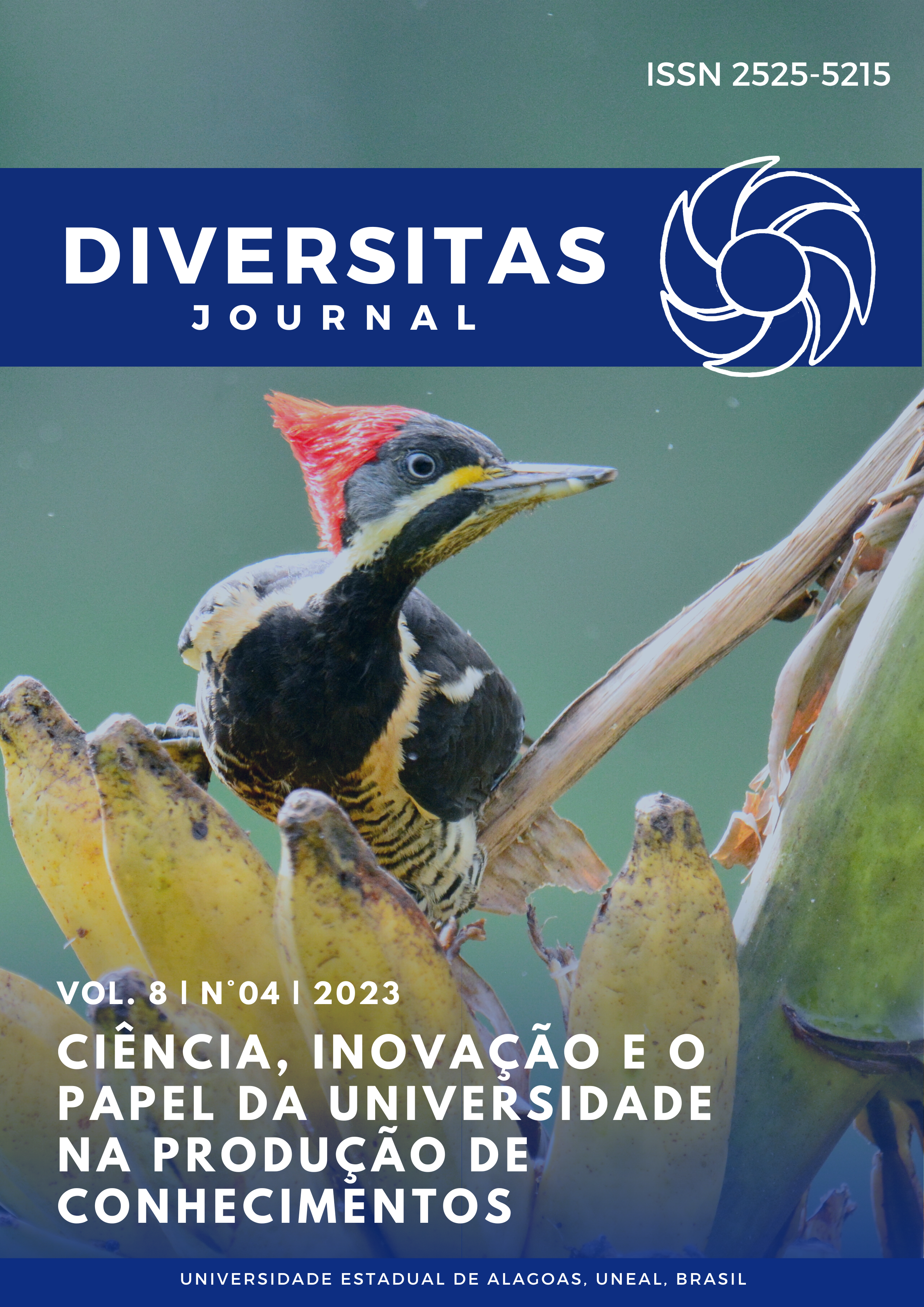Estágio curricular supervisionado IV
um estudo do gênero textual letra de música em língua inglesa
DOI:
https://doi.org/10.48017/dj.v8i4.2639Palavras-chave:
Sequência didática, educação básica, produção escritaResumo
Reconhecidamente, o estágio curricular é um ato pedagógico, obrigatório, conforme Art. 82 da Lei Federal nº 9.394/96; ele promove a iniciação à docência, possibilita uma inter-relação entre a teoria e a prática e oportuniza o crescimento profissional e pessoal para os graduandos dos cursos de formação de professores. Nesse sentido, este artigo tem como objetivo apresentar um estudo sobre a aprendizagem de alunos do 2º ano do Ensino Médio de uma escola pública da cidade de Taquarana-Alagoas, com o gênero textual discursivo letra de música, desenvolvido durante o Estágio Curricular Supervisionado IV em Língua Inglesa, no 7º período de Inglês na Universidade Estadual de Alagoas - Uneal, em 2022. Para isso, utilizamos uma Sequência Didática, um dispositivo que vem sendo utilizado em sala de aula por professores de língua inglesa para o desenvolvimento das quatro habilidades: reading (ler), writing (escrever), listening (ouvir) e speaking (falar). Nosso embasamento teórico deu-se a partir dos textos de Freitas (2004), que conceitua o estágio supervisionado e estratégias de ensino; Pimenta e Lima (2011); Griffee (1992) e Gobbi (2001), que tratam sobre letra de música; Bakhtin (2011), que aponta os elementos constitutivos do gênero discursivo; Marcuschi (2008), que aborda gêneros textuais no ensino de língua; e, no campo metodológico, em Dolz, Noverraz e Schneuwly (2004), que propõem um modelo de Sequência didática (SD); dentre outros estudiosos sobre gêneros. Os resultados apontam avanços positivos no aprendizado das capacidades trabalhadas na sala de aula de língua inglesa.Métricas
Referências
Bakhtin, Mikhail Mikhailovivith (2011). Estética da Criação Verbal./Mikhail Mikhailovivith Bakhtin: prefácio à edição francesa Tzvetan Todorov. Introdução e tradução do russo Paulo Bezerra -6. Ed. São Paulo: Editora WMF Martins Fontes.
Bawarshi, A. S.; Reiff, M (2013). J. Gênero: teoria, pesquisa, ensino. Tradução de Benedito Gomes Bezerra. São Paulo: Parábola. Título original: Genre: Na Introduction to history, theory, reserch, and pedagogy.
Bazerman, Charles (2006). Gênero, agência e escrita/Charles Bazerman; Judith Chambliss Hoffnagel, Angela Paiva Dionísio (organizadoras). São Paulo: Cortez.
Brasil. Ministério da Educação e do Desporto. (1998). Parâmetros Curriculares Nacionais - PCN. http://portal.mec.gov.br/seb/arquivos/pdf/introducao.pdf
Clarkson, Kelly. (2022, agosto, 15). Stronger (What Doesn’t Kill You) [Official Video]. Youtube BR. https://www.youtube.com/watch?v=Xn676-fLq7I&list=RDXn676-fLq7I&index=1
Costa, A. C. G (2006). As bases éticas da ação socioeducativa: Referenciais Normativos e Princípios Norteadores. Brasília: Secretaria Especial dos Direitos Humanos. http://ens.ceag.unb.br/sinase/ens2/images/Biblioteca/Livros_e_Artigos/material_curso_de_formacao_da_ens/As%20Bases%20Eticas%20da%20A%C3%A7%C3%A3o%20Socioeducativa.pdf
Dolz, J.; Noverraz, M. & Schneuwly, B (2010). Sequências didáticas para o oral e a escrita: apresentação de um procedimento. In: R. Rojo; G. Cordeiro. Gêneros Orais e Escritos na escola./Tradução e organização Roxane Rojo e Glaís Sales. 2. ed. – Campinas, SP: Mercado das Letras.
Freitas, Maria Adelaide de (2004). Educação e ensino de língua estrangeira hoje: implicações para a formação de seus respectivos profissionais e aprendizes. In: Abrahão, Maria Helena Vieira (Org.). Prática de ensino de língua estrangeira. Experiência e reflexões. Campinas, SP: Pontes, Arte Língua.
Gobbi, Denise (2021). A música enquanto estratégia de aprendizagem no ensino de língua inglesa. Porto Alegre: Programa de Pós-Graduação em Estudos da Linguagem. Universidade de Caxias do Sul e Universidade Federal do Rio Grande do Sul. Porto Alegre. Dissertação de Mestrado. Recuperado em: https://www.lume.ufrgs.br/bitstream/handle/10183/3066/000331440.pdf
Griffee, D. T. (1995). Songs in action. Hertfordshire: Phoenix.
Holden, Suzan (2009). O Ensino da Língua Inglesa nos dias atuais. São Paulo: Speak Book Services Livraria.
Marcuschi, Luiz Antônio (2008). Produção textual, análise de gêneros e compreensão. São Paulo, Parábola Editorial.
Marques, M. A.; Basso, R. A. A. (2022, maio, 30). Ensinando inglês através do gênero discursivo música – CLIPS. Recuperado em: http://www.diaadiaeducacao.pr.gov.br/portals/pde/arquivos/2477-8.pdf
Meurer, J. L. O. (2022, agosto, 26). Conhecimento de Gêneros Textuais e a Formação do Profissional da Linguagem. In: Fortkamp, M. B. M.; Tomitch. L. M. B. (Org.). Aspectos da Linguística Aplicada. estudos em homenagem ao Professor Hilário Inácio Bohn. 1. ed. Florianópolis, SC:
Insular, 2021. 344 p.; tabs. E-book: 1,71 Mb. PDF. ISBN 978-85-524-0183-4 Recuperado em: https://books.google.com.br/books?hl=ptBR&lr=&id=e1M_EAAAQBAJ&oi=fnd&pg=PA149&ots=G9po-k6Wu_&sig=ebGZ5OED6NXW_3QJ3fl3tgsr4do&redir_esc=y#v=onepage&q&f=false
Pimenta, S. G.; Lima, M.S.L. (2011). Estágio e Docência. 6. ed. São Paulo: Cortez.
Downloads
Publicado
Como Citar
Edição
Seção
Licença
Copyright (c) 2023 José Barbosa Costa, Maria Verônica Tavares Neves Cardoso

Este trabalho está licenciado sob uma licença Creative Commons Attribution 4.0 International License.
O periodico Diversitas Journal expressa que os artigos são de unica responsabilidade dos Autores, conhecedores da legislação Brasileira e internacional. Os artigos são revisados pelos pares e devem ter o cuidado de avisar da possível incidencia de plagiarismo. Contudo o plagio é uma ação incontestavel dos autores. A Diversitas Journal não publicará artigos com indicios de Plagiarismos. Artigos com plagios serão tratados em conformidade com os procedimentos de plagiarismo COPE.
A violação dos direitos autorais constitui crime, previsto no artigo 184, do Código Penal Brasileiro:
“Art. 184 Violar direitos de autor e os que lhe são conexos: Pena – detenção, de 3 (três) meses a 1 (um) ano, ou multa. § 1o Se a violação consistir em reprodução total ou parcial, com intuito de lucro direto ou indireto, por qualquer meio ou processo, de obra intelectual, interpretação, execução ou fonograma, sem autorização expressa do autor, do artista intérprete ou executante, do produtor, conforme o caso, ou de quem os represente: Pena – reclusão, de 2 (dois) a 4 (quatro) anos, e multa.”


















